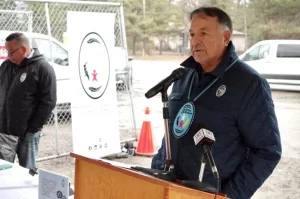Chi Mino Ozhitoowin acquires new land for new opportunities

By Rick Garrick
THUNDER BAY — Chi Mino Ozhitoowin CEO Peter Collins announced the acquisition of a 56-acre property once owned by Thunder Bay Pulp and Paper along Hwy. 61 in Thunder Bay for future training initiatives on April 23. Formerly known as the Riverview Raceway, the property is located just southwest of the Chippewa Rd. turnoff to Fort William.
“I know this is a longstanding dream for former Chief (Peter) Collins, a place for training where First Nation people are really leading the training opportunity and the training initiatives that are happening,” says Fort William Chief Michele Solomon. “So it’s definitely a proud moment for me to be a First Nation that is part of this partnership and that this is happening in the territory of Fort William First Nation. I really want to congratulate everybody, all the Chiefs and communities that have been part of this work, Chi Mino Ozhitoowin for their heavy lifting to get this over the finish line and the ongoing efforts every day to form these partnerships, Thunder Bay Pulp and Paper, your participation in this partnership, these are vital things.”
Chi Mino Ozhitoowin, owned by seven First Nations including Fort William, has partnered with Valard Construction LP and Hydro One Network Inc. for the construction of the Waasigan Transmission Line in northwestern Ontario.
“This is a great opportunity for building a relationship between First Nations and Thunder Bay Pulp and Paper — it’s a part of economic reconciliation,” Collins says. “So it’s an important step forward, I think this will be the first one of this magnitude in Ontario. I think we need more but this is a stepping stone and we hope to pave a path forward for other industries and other initiatives around the region.”
Collins says he thanks Thunder Bay Pulp and Paper and its board for thinking outside the box.
“I think this is the first time in Ontario that anything of this magnitude has been done — we’re trying to change the trend of economic growth and prosperity for our communities,” he says. “We’re always looking at how we can do that, how we can make it better, how we can work together. We hear that a lot, working together, building economic reconciliation, but this is really a testament of what that is today, and we need more testaments like this in the country of Canada.”
Collins says they need to create opportunities for First Nations people.
“We need to have a light at the end of the tunnel so people can see there is hope and prosperity, hope and opportunities and growth, that they can build a stable family, stable livelihood,” Collins says. “We’re going to lean on the politicians a lot over the next couple of weeks and the next couple of months and into the New Year to really get this land developed in the nature that we want to develop it.”
Collins says he is honoured to be a part of Chi Mino Ozhitoowin.
“I have a path that I’ve been given by our communities and our partnerships to really change the concept of where we’re going and to help build economies in our communities,” Collins says. “The communities lean on each other, we all lean on each other to build a positive way of life for all of our members in our communities.”
Bill MacPherson, CEO at Thunder Bay Pulp and Paper, says it feels good to be on a path of reconciliation, consultation, and healing.
“When we learn from our past, we ensure our future and those lessons are showing their value here today,” McPherson says. “I met Peter just last week and I’m already inspired by his vision. It takes many people to make an initiative like this come together. We’re forging a path together, a path that’s not only built on the principles of reconciliation but also paves the way for economic growth and stability as Peter just mentioned, one that will help create new and direct opportunities in our community for training, working in interesting fields and providing for our families.”

